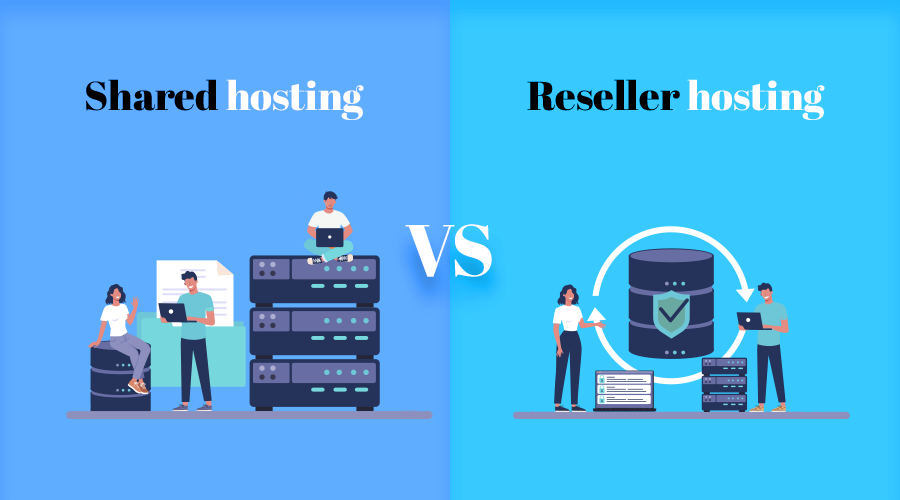Choosing the right hosting plan is essential for your website’s success, but with so many options, it can be confusing.
When comparing reseller hosting vs shared hosting, it’s important to understand the differences between the two.
Reseller hosting offers more control and scalability, while shared hosting is a more affordable option for smaller websites.
In this guide, we’ll break down the key differences, advantages, and help you decide which option is right for your needs.
What Is Shared Hosting?
Shared hosting is the most common and affordable type of web hosting available.
It involves multiple websites sharing the same server and its resources, such as CPU, RAM, storage, and bandwidth.
Shared hosting is typically used by individuals or small businesses that are just starting out and have relatively low traffic or minimal technical needs.
Key Features of Shared Hosting:
- Affordable: Shared hosting is often the most budget-friendly option, as the server’s resources are shared between many users.
- Limited Resources: Since resources are shared with other websites, if one website experiences a traffic surge, it could affect the performance of other sites on the same server.
- Easy Setup: Most shared hosting providers offer one-click installations for popular content management systems (CMS) like WordPress, Joomla, and Drupal, making it easy for beginners to set up their websites.
- Limited Control: Users typically have limited access to server settings and configurations. The hosting provider manages the server’s technical aspects.
- Basic Support: Support for shared hosting plans tends to be more generalized. While customer support is available, it might not be as hands-on or tailored to specific issues as with higher-tier hosting plans.
Best for:
- Personal blogs and portfolios.
- Small business websites with low traffic.
- Individuals or businesses looking for a cost-effective entry into web hosting.
What Is Reseller Hosting?
Reseller hosting is a type of web hosting where you, as a reseller, purchase hosting resources from a hosting provider and then sell them to your clients.
In essence, you are buying hosting space in bulk and reselling it as individual hosting accounts to your customers.
Reseller hosting provides more control and flexibility than shared hosting, as it’s often designed for web designers, agencies, or entrepreneurs looking to offer their own hosting services.
Key Features of Reseller Hosting:
- Resource Allocation: Reseller hosting gives you the ability to create and manage multiple hosting accounts for clients. You can allocate specific resources (such as bandwidth, storage, and domains) to each account, making it easy to provide tailored services.
- Branding: Most reseller hosting plans allow you to brand the hosting service as your own. This includes custom domain names, personalized billing, and branded client panels (such as cPanel/WHM).
- Scalability: Reseller hosting plans are typically more scalable than shared hosting. As your client base grows, you can easily upgrade your resources to accommodate more websites without needing to migrate to another server.
- Full Control: With reseller hosting, you have more control over the hosting environment. You can manage user accounts, perform technical customizations, and even resell additional services like domains or SSL certificates.
- Better Support Options: Reseller hosting providers often offer more comprehensive support to help you manage your clients’ hosting accounts. Some also provide white-label support, where the hosting provider handles technical support on your behalf while you maintain your branding.
Best for:
- Web agencies or designers who want to offer hosting to their clients.
- Entrepreneurs looking to start their own hosting business.
- Businesses that require more control and flexibility over their hosting environment.
Reseller Hosting vs Shared Hosting: Key Differences
1. Purpose and Use Case
- Shared Hosting: Best suited for personal websites, small businesses, or beginners with basic hosting needs. It’s affordable and easy to use but offers limited control and resources.
- Reseller Hosting: Ideal for web professionals, agencies, or entrepreneurs who want to sell hosting as a service. It provides greater flexibility, control, and scalability, making it perfect for those managing multiple websites or clients.
2. Resources and Performance
- Shared Hosting: Resources are shared with multiple websites, so performance can suffer during traffic spikes. This can affect your website’s speed and reliability, particularly if other websites on the same server consume excessive resources.
- Reseller Hosting: Since reseller hosting plans offer dedicated resources for each client account, you can allocate more bandwidth and storage to specific websites. This results in better performance and more consistent uptime compared to shared hosting.
3. Pricing
- Shared Hosting: Shared hosting is typically cheaper, making it a great option for beginners or small businesses with limited budgets. Prices generally start from a few dollars per month.
- Reseller Hosting: Reseller hosting is more expensive, as you’re essentially purchasing bulk resources to manage multiple accounts. Pricing depends on the amount of disk space, bandwidth, and other features included in the plan. While the initial cost may be higher, reseller hosting can be more profitable in the long run if you plan to resell hosting to clients.
4. Control and Customization
- Shared Hosting: With shared hosting, your control is very limited. You typically don’t have access to server configurations and settings. The hosting provider manages the technical aspects.
- Reseller Hosting: Reseller hosting provides more control, allowing you to customize server settings, manage client accounts, and even install additional software. It also gives you the ability to brand the hosting services under your own name, making it a more flexible and professional solution.
5. Security and Reliability
- Shared Hosting: While most hosting providers offer security features for shared hosting, the shared nature of the server means that vulnerabilities in one site can potentially impact others. As a result, security can be a concern for high-traffic or sensitive websites.
- Reseller Hosting: With reseller hosting, you have more control over the security of individual accounts. Reseller providers often offer stronger security measures, including enhanced firewalls, regular backups, and advanced DDoS protection. Additionally, reseller hosting plans often provide better uptime guarantees.
6. Support
- Shared Hosting: Shared hosting typically includes basic customer support, which is suitable for general inquiries. However, since shared hosting plans are designed for individuals or small businesses, support can be less specialized.
- Reseller Hosting: Reseller hosting includes more tailored support for managing multiple accounts. Many reseller hosting providers offer 24/7 support with specialized assistance to help resellers manage technical issues and client needs.
When to Choose Shared Hosting
Shared hosting is a great option if you are:
- A beginner with a personal website or blog.
- A small business owner with a limited budget.
- Looking for an easy-to-use, cost-effective hosting solution without the need for extensive technical knowledge.
When to Choose Reseller Hosting
Reseller hosting is the ideal choice if you:
- Are a web designer, developer, or agency wanting to offer hosting services to clients.
- Plan to resell hosting services and create multiple hosting accounts.
- Need more control, flexibility, and scalability for multiple websites or businesses.
- Want to start your own hosting business and need dedicated resources.
Read more Reseller Hosting with Free SSL Certificates…
Conclusion
The choice between reseller hosting vs shared hosting ultimately depends on your goals, budget, and the level of control you need over your hosting environment.
Shared hosting is perfect for individuals and small businesses looking for an affordable, low-maintenance solution.
On the other hand, reseller hosting is best for agencies, developers, or entrepreneurs who want more control, customization, and the ability to resell hosting services.
If you’re simply hosting a personal website or a small business site, shared hosting offers a budget-friendly and straightforward solution.
However, if you want to grow your business, manage multiple websites, or offer hosting to clients, reseller hosting is the more powerful and scalable option.
Consider your needs carefully before making a decision to ensure you’re choosing the right hosting solution for your goals.






